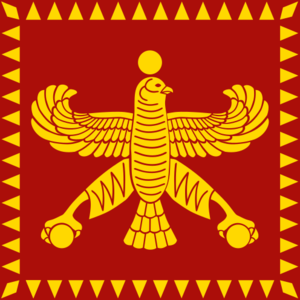「シャーバーズ(鳥)」の版間の差分
ナビゲーションに移動
検索に移動
(→参考文献) |
|||
| (同じ利用者による、間の14版が非表示) | |||
| 1行目: | 1行目: | ||
| + | [[File:Standard of Cyrus the Great.png|thumb|300px|アケメネス朝を築いたキュロス大帝(ペルシア語:Derafsh Shahbaz)の王旗で、シャーバーズが特徴とされる。]] | ||
'''シャーバーズ'''(Shahbaz'(شَهباز or شاهباز))は、[[イラン神話|ペルシア神話]]に登場する伝説の鳥の名前である<ref>Mark, Joshua J., 16 January 2020, Ancient Persian Gods, Heroes, and Creatures - The Complete List, https://www.worldhistory.org/article/1488/ancient-persian-gods-heroes-and-creatures---the-co/ , =2022-04-04 , World History Encyclopedia</ref> 。ワシに似た体つきで、タカやハヤブサより大きく、広大なイランのザグロス山脈、アルボルズ山脈、コーカサス山脈のどこかに生息していたとされる。古代[[イラン神話|ペルシア神話]]では、シャーバーズはイラン民族を助け、ファラヴァハル<ref>ゾロアスター教のシンボルの一つ。</ref>を大イランに導いた神とされている。 | '''シャーバーズ'''(Shahbaz'(شَهباز or شاهباز))は、[[イラン神話|ペルシア神話]]に登場する伝説の鳥の名前である<ref>Mark, Joshua J., 16 January 2020, Ancient Persian Gods, Heroes, and Creatures - The Complete List, https://www.worldhistory.org/article/1488/ancient-persian-gods-heroes-and-creatures---the-co/ , =2022-04-04 , World History Encyclopedia</ref> 。ワシに似た体つきで、タカやハヤブサより大きく、広大なイランのザグロス山脈、アルボルズ山脈、コーカサス山脈のどこかに生息していたとされる。古代[[イラン神話|ペルシア神話]]では、シャーバーズはイラン民族を助け、ファラヴァハル<ref>ゾロアスター教のシンボルの一つ。</ref>を大イランに導いた神とされている。 | ||
== 歴史 == | == 歴史 == | ||
| − | '''シャーバーズ'''(Shahbaz)という言葉は、直訳すると「王家の鷹」という意味である<ref name="Burton">Burton , Sir Richard Francis , https://archive.org/details/falconryinvalle00burtgoog , Falconry in the valley of the Indus , 1852 , Richard Francis Burton</ref><ref>Brill , E. J. , First Encyclopaedia of Islam 1913-1936</ref><ref name=":0">Altmann , Peter , https://books.google.co.in/books?id=IjfBDwAAQBAJ&redir_esc=y , Banned Birds: The Birds of Leviticus 11 and Deuteronomy 14 , 2019-12-03 , Mohr Siebeck , isbn:978-3-16-158163-2 , 17-18p</ref>。この時代、シャー(Shah:''王'')は王家の鷹や猛禽類を飼う習慣があった<ref>{Khan , Hazrat Inayat , https://books.google.co.in/books?id=C2yMzM1S-iYC&redir_esc=y , The Sufi Message of Hazrat Inayat Khan: The Smiling Forehead , 2020-09-28 , Library of Alexandria , isbn:978-1-61310-665-5 , 69p</ref>。 | + | '''シャーバーズ'''(Shahbaz)という言葉は、直訳すると「王家の鷹」という意味である<ref name="Burton">Burton , Sir Richard Francis , https://archive.org/details/falconryinvalle00burtgoog , Falconry in the valley of the Indus , 1852 , Richard Francis Burton</ref><ref>Brill , E. J. , First Encyclopaedia of Islam 1913-1936</ref><ref name=":0">Altmann , Peter , https://books.google.co.in/books?id=IjfBDwAAQBAJ&redir_esc=y , Banned Birds: The Birds of Leviticus 11 and Deuteronomy 14 , 2019-12-03 , Mohr Siebeck , isbn:978-3-16-158163-2 , 17-18p</ref>。この時代、シャー(Shah:''王'')は王家の鷹や猛禽類を飼う習慣があった<ref>{Khan , Hazrat Inayat , https://books.google.co.in/books?id=C2yMzM1S-iYC&redir_esc=y , The Sufi Message of Hazrat Inayat Khan: The Smiling Forehead , 2020-09-28 , Library of Alexandria , isbn:978-1-61310-665-5 , 69p</ref>。この鳥の図像は、強さと攻撃性を表現している<ref name=":0" /> 。古代エジプトのホルス神は、キュロス大帝の軍旗の原型であったと推測されている<sup>(要出典:April 2022)</sup>。 |
| + | イギリスの探検家リチャード・F・バートン(Richard Francis Burton)は、この図像をオオタカの一種、''Accipiter gentilis''(オオタカ)を指すと考えた<ref name="Burton" />。シャーバーズは、ペルシャ高原の空でよく見られる別の鳥、東の帝王である鷲(わし)を指すこともできたが、この考察を歴史家が正当と主張したことはない。 | ||
| − | + | アケメネス朝時代、ペルシャの皇帝旗は長方形で、凧のように4つの三角形に分けられ、2つの色が交互に配されたものであった。王旗は20世紀初頭のペルセポリスの発掘調査によって、シャーバーズ(Derafsh-e Shahbaz-e-Talayi)と推測される伝説の鳥のような生物が刻まれた陶板として発見された。キュロス大王とその後継者たちの時代、シャーバーズはイラン帝国の公式な王旗だったと考えられている<sup>(要出典:September 2021)</sup>。 | |
| − | |||
| − | |||
| − | |||
| − | |||
| − | |||
| − | |||
== 関連項目 == | == 関連項目 == | ||
| 19行目: | 15行目: | ||
== 参考文献 == | == 参考文献 == | ||
| − | * Wikipedia:[https://en.wikipedia.org/wiki/Shahbaz_(bird) Shahbaz (bird)] | + | * Wikipedia:[https://en.wikipedia.org/wiki/Shahbaz_(bird) Shahbaz (bird)](最終閲覧日:22-04-09) |
== 参照 == | == 参照 == | ||
| 27行目: | 23行目: | ||
[[Category:鳥]] | [[Category:鳥]] | ||
[[Category:霊鳥]] | [[Category:霊鳥]] | ||
| + | [[Category:王権神授]] | ||
2022年4月9日 (土) 00:09時点における最新版
シャーバーズ(Shahbaz'(شَهباز or شاهباز))は、ペルシア神話に登場する伝説の鳥の名前である[1] 。ワシに似た体つきで、タカやハヤブサより大きく、広大なイランのザグロス山脈、アルボルズ山脈、コーカサス山脈のどこかに生息していたとされる。古代ペルシア神話では、シャーバーズはイラン民族を助け、ファラヴァハル[2]を大イランに導いた神とされている。
歴史[編集]
シャーバーズ(Shahbaz)という言葉は、直訳すると「王家の鷹」という意味である[3][4][5]。この時代、シャー(Shah:王)は王家の鷹や猛禽類を飼う習慣があった[6]。この鳥の図像は、強さと攻撃性を表現している[5] 。古代エジプトのホルス神は、キュロス大帝の軍旗の原型であったと推測されている(要出典:April 2022)。
イギリスの探検家リチャード・F・バートン(Richard Francis Burton)は、この図像をオオタカの一種、Accipiter gentilis(オオタカ)を指すと考えた[3]。シャーバーズは、ペルシャ高原の空でよく見られる別の鳥、東の帝王である鷲(わし)を指すこともできたが、この考察を歴史家が正当と主張したことはない。
アケメネス朝時代、ペルシャの皇帝旗は長方形で、凧のように4つの三角形に分けられ、2つの色が交互に配されたものであった。王旗は20世紀初頭のペルセポリスの発掘調査によって、シャーバーズ(Derafsh-e Shahbaz-e-Talayi)と推測される伝説の鳥のような生物が刻まれた陶板として発見された。キュロス大王とその後継者たちの時代、シャーバーズはイラン帝国の公式な王旗だったと考えられている(要出典:September 2021)。
関連項目[編集]
参考文献[編集]
- Wikipedia:Shahbaz (bird)(最終閲覧日:22-04-09)
参照[編集]
- ↑ Mark, Joshua J., 16 January 2020, Ancient Persian Gods, Heroes, and Creatures - The Complete List, https://www.worldhistory.org/article/1488/ancient-persian-gods-heroes-and-creatures---the-co/ , =2022-04-04 , World History Encyclopedia
- ↑ ゾロアスター教のシンボルの一つ。
- ↑ 3.0 3.1 Burton , Sir Richard Francis , https://archive.org/details/falconryinvalle00burtgoog , Falconry in the valley of the Indus , 1852 , Richard Francis Burton
- ↑ Brill , E. J. , First Encyclopaedia of Islam 1913-1936
- ↑ 5.0 5.1 Altmann , Peter , https://books.google.co.in/books?id=IjfBDwAAQBAJ&redir_esc=y , Banned Birds: The Birds of Leviticus 11 and Deuteronomy 14 , 2019-12-03 , Mohr Siebeck , isbn:978-3-16-158163-2 , 17-18p
- ↑ {Khan , Hazrat Inayat , https://books.google.co.in/books?id=C2yMzM1S-iYC&redir_esc=y , The Sufi Message of Hazrat Inayat Khan: The Smiling Forehead , 2020-09-28 , Library of Alexandria , isbn:978-1-61310-665-5 , 69p
